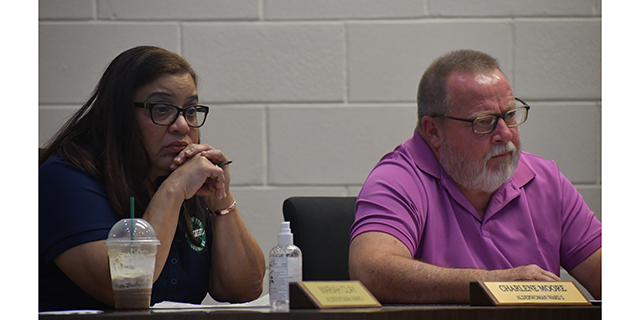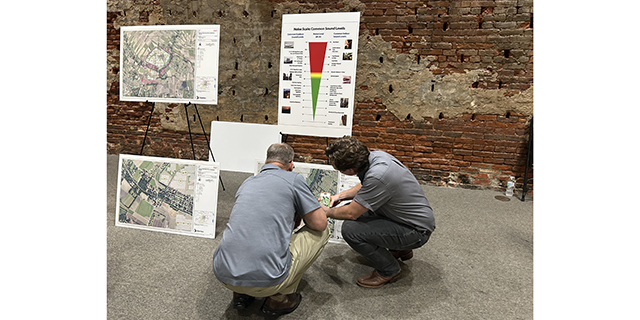The Iberia Parish Sheriff Office launched its Special Needs Registry
Published 4:15 am Tuesday, August 22, 2023

- Scan the QR code to download the IPSO app and register.
The Iberia Parish Sheriff Office (IPSO) launched their private Special Needs Registry for Iberia Parish residents outside the city.
The registry allows individuals in Iberia Parish that live outside the city to provide a comprehensive set of information about themselves or a family member with disabilities and impairments. They can list their disability, “stims” or any visual and/or auditory cues of an episode, their triggers, their interests, emergency contacts and any other specific pieces of information.
The registry isn’t just for Autism Spectrum Disorder and Asperger’s Syndrome, but also for individuals with auditory impairment, Epilepsy, Alzheimer’s Disease, and Dementia.
The registry gives IPSO deputies quick access to critical information like emergency contact information, detailed physical descriptions, triggers or special needs about a registered person with special needs.
By addressing a variety of disabilities, Sheriff Tommy Romero said he hopes to promote a safer environment for everyone.
“It’s for the safety of our officers, but more importantly the safety of our residents,” Romero said.
Officer James Smith initially proposed the idea after attending a class about identifying disabilities. Smith is a sheriff’s deputy with over 20 years of law enforcement experience. He worked at the sheriff’s department from 2010 to 2013, when he retired from law enforcement altogether.
Officer shortages brought him back to law enforcement in 2020.
Smith’s step-son, Steven, is autistic, and a friend recommended the class.
It broke down the different responses and cues of people with developmental disabilities. The class was comprehensive. Not only did he learn about the different disabilities, he had an opportunity to work with them hands-on. A local school for young adults with disabilities demonstrated various stimulus responses from full shutdowns to extreme stimming.
Smith returned from the class with a newfound passion, and equipped with his new skills, he proposed and helped guide the creation of the special needs registry.
“It was good to see outside of my own bubble. I need our citizens to feel safe with us and that means all our citizens, whether they’re in elementary school or high school or sleeping in their car. They need to know they can count on us,” Smith said.
To fill out the registry, visit the IPSO website or download the IPSO app. There is a brief registration process by listing disabilities, contacts and other information. After they complete the form, they must ensure they receive confirmation. If they didn’t receive confirmation, the office didn’t receive their information.
It may be a brief process, but it’s one Director of Public Affairs Katherine Breaux believes is necessary as a parent or family member.
“It takes 10 minutes to ensure your child is the most important thing,” Breaux said.
Individuals looking to register have total control over the information they provide. That information remains private from the public, and only the dispatchers and responding officers are notified of necessary information. Smith provided the perfect analogy to describe the role of the registry.
“It’s not about bringing those people that don’t want to be recognized into the spotlight, it’s putting a nightlight in there so that we can find them in the dark when they need us,” Smith said.
Individuals with disabilities may demonstrate unusual visual behaviors like fully disengaging from conversation and certain stims like arm flapping. In standard procedure, this could be identified as drug use. If the responding officer already knows what to expect with a child or adult, things can go significantly smoother.
“It gives us a better tool for us to interact with our general public. We don’t want anyone harmed, tased, pepper sprayed or taken down because we didn’t know,” Smith said.
Smith emphasized the importance of recognizing and responding to an incident or an episode appropriately. Certain people with disabilities need a level approach that helps them feel comfortable with an officer.
“If we know little Joelle is autistic, and when she stims, she crosses her arms and legs and rocks back and forth, but if you get on her level, and that means you might have to sit your big butt down on the ground, and talk gently with her about her favorite band or color and rock with her and calm her down, then we just saved a life,” Smith said.
The office urges residents, especially parents registering their children, to update their entry annually to ensure complete accuracy for the officers. Simply having an up-to-date photo in the event someone is missing can ensure a quicker response. The sheriff plans to implement a notification system and recommends using the registered person’s birthday as a reminder.
Sheriff Romero emphasized the importance of keeping training and practices up-to-date so his officers can effectively respond to a variety of situations.
“They didn’t have special needs training when I went to the academy. It was always how you deal with a person on drugs. It’s always good to have updated training. As the times change, we have to change with the times,” Romero said.
It doesn’t matter what type of call the officer is responding to, if the address or number correlates with a person in the system, it will automatically inform the dispatch and officer. Whether it’s a missing child, a drug call, or even a domestic violence situation, the officer will know who in the household is on the registry, and how they can change their response.
Breaux described a situation where an older sibling pinned a younger sibling with Autism down in an attempt to calm them down. If the officer didn’t know that the child being pinned had Autism and was the potential hazard, they might have misunderstood and viewed the older sibling as an aggressor.
“For instance, there may have been a domestic situation that didn’t involve the child, but when they get there, they can see this kid is agitated,” Breaux said.
Despite the procedure and registry, Smith said it’s important that officers view and treat these individuals with respect.
“I hate saying that they’re disabled because they are not. We just have to learn how to deal with them in their world.” Smith said.
Any Iberia Parish residents interested in registering themselves or a family member, can scan the QR code, download the app or go online to www.iberiaso.org and fill out the registry.





